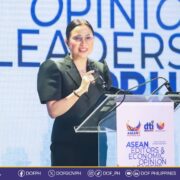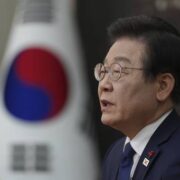Accountability and growth: Nonnegotiables

Filipinos are clear about what matters most: the economy. In the latest Pulse Asia survey (June 26–30, 2025), respondents overwhelmingly identified economic issues as the top concerns that they want the President to tackle in the upcoming State of the Nation Address. Controlling inflation (32.9 percent), reducing the cost of goods and services (25.8 percent), lowering rice prices (7.1 percent), increasing wages (13.6 percent), expanding employment and livelihood opportunities (8.8 percent), and reducing poverty and hunger (6.6 percent) lead the list.
The daily struggles of soaring prices, stagnant wages, job insecurity, and deepening inequality define the lived experience of millions. These priorities, echoed across past surveys, highlight the same urgent reality: economic survival is still the nation’s overriding concern.
And yet, the root of many of these problems goes deeper. Economic hardship and corruption—rooted in a lack of accountability—are profoundly linked. When corruption flourishes, public money is siphoned away from essential services. When oversight fails, infrastructure collapses. When impunity reigns, trust erodes. Every act of misgovernance compounds the economic pressure ordinary Filipinos already face.
It’s in this context that the impeachment trial of Vice President Sara Duterte must be understood—not as a distraction from economic priorities, but as a challenge of whether the legislature can walk and chew gum at the same time.
The impeachment process, while quasi-judicial, is inherently political. Senators, elected by the people, serve as judges in this constitutional proceeding. But their responsibility doesn’t stop there. They must also continue their legislative duties—crafting and pushing laws to boost the economy and uplift public welfare. Their dual role requires discipline, not deflection.
It may be argued that a high-profile impeachment trial creates political instability. Critics say it signals elite infighting rather than policy focus. But the counterargument is more compelling: a functioning system of checks and balances builds, not breaks, national stability. When high officials are held to account for how they spend taxpayer money, the rule of law is affirmed, not undermined.
Accountability is not a roadblock to growth—it is the foundation of sustainable growth. Investors know this. They prefer systems where institutions hold power in check, where justice is pursued with transparency, and where no public servant is above the law.
Good governance is not just about technocratic efficiency. It’s about trust. And trust fuels investment, innovation, and economic momentum. That’s why the Senate must prove it can handle both imperatives: justice and growth.
Economic reform cannot stall. A swift and transparent trial process must be matched by urgency in legislative work. Congress must move forward on key priorities—economic stimulus, agricultural modernization, labor upskilling, health-care expansion, and digital infrastructure. The problems highlighted in the Pulse Asia survey are not going away, and every delay makes life harder for the millions already struggling.
There are signs of potential. Investment interest remains active. The Board of Investments reports a rise in approved projects. The 2025 Kearney FDI Confidence Index ranks the Philippines 16th among emerging markets. Investors cite the country’s young, English-speaking labor force and its consumer-driven economy as advantages.
But talent and demographics alone are not enough. According to the same Kearney index, the most decisive factors for foreign investors are transparency, efficiency, and the consistency of the legal and regulatory environment. Put simply: political will to uphold the rule of law, not just political theater.
That’s why the impeachment process matters. How it unfolds—and whether it is executed with fairness and speed—will be a strong signal to both the public and the global market.
The Senate’s role is pivotal. Legislators must show the nation that integrity and productivity are not mutually exclusive. They must conduct a credible trial while continuing the urgent work of lawmaking. Filipinos expect both.
This is not about choosing between stability and scrutiny. It’s about proving we can deliver both. Because without accountability, economic reform will collapse under the weight of corruption.
This is a test of statesmanship—of the ability to lead without compromise on principle or progress. Accountability and growth are both non-negotiable. The nation is watching. Filipinos expect no less.
—————-
Dindo Manhit is the founder and CEO of Stratbase Group.

















